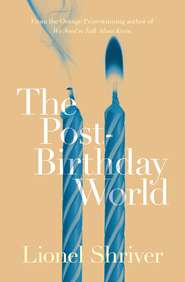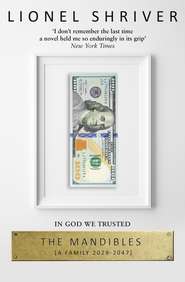По всем вопросам обращайтесь на: info@litportal.ru
(©) 2003-2024.
✖
Game Control
Автор
Год написания книги
2018
Настройки чтения
Размер шрифта
Высота строк
Поля
“It’s technologically impractical. All that money towards dead-end research just because young girls who take snaps have weak stomachs. But in East African parks, it won’t come to over-population. As human numbers here go over the top, the desperation level rises as steadily as the water table goes down. You know that Kenya has imported the SAS? They use the same shoot-to-kill on poachers as they do on the IRA. Still, as long as a pair of tusks will fetch sterling pound for pound, the poachers will keep trying. And I don’t blame the wretches. If I were some scarecrow villager, I’d probably shoot elephants wholesale. The dinosaurs are doomed anyway, so someone should cash in.”
Calvin’s green monkey had screamed and run away when Eleanor first walked in, but since had climbed to a balcony overhanging the living room with a basket from the kitchen. For the past five minutes, he had been pitching gooseberries from overhead, and the accuracy with which they landed on Eleanor suggested the target was not arbitrary. She had tried politely to pick the green berries from her hair, but the squashed ones were staining her dress. “Um,” she finally objected. “Calvin?”
“Malthus!” Calvin picked up the handful of gooseberries she had neatly piled on the table and threw them back at the monkey, who scurried down the stairs, to assume a glare through the grille from the patio more unsettling than pitched fruit. “Sorry. Malthus doesn’t like guests. Don’t take it personally. Malthus, I suspect, doesn’t even like me.”
“This culling work—” She collected herself, still finding pulp in her cuff. “Is that what got you into demography?”
“Quite. Ah, but graduate school was deadly dry after Murchison Falls … Perhaps demographics was a mistake. Since then my life has been conducted on paper. It’s not my nature. I like aeroplanes, projects, a little bang-bang.”
“Was the work dangerous?”
“Not at all. Shooting those massive grey bull’s-eyes in open grassland was easy as picking off cardboard boxes. And they’re supposed to be so intelligent, but they’re hopelessly trusting. That isn’t intelligent.”
“You don’t talk about elephants with much affection.”
“They make me angry.”
“Why?”
“I don’t know.”
“So in your view the elephants have had it?”
It was a little queer. While she had noticed the cold in Calvin’s eyes, they had at least remained dark and clear; but as she watched, a film cast over them. Calvin sat down abruptly as if someone had pushed him. “It doesn’t matter.”
Eleanor cocked her head. “That’s odd. I was getting the impression only a moment ago that wildlife meant a great deal to you.”
“A moment ago it did.” Calvin’s body gave a short jerk, as if starting at the wheel. “Curry,” he said.
Trying to be conversational, Eleanor asked while nibbling her chicken, “What do you think of the AIDS situation in Kenya? Do you expect it will take off?”
“I think far too much is being made of that virus,” he said irritably. “What’s one more deadly disease?”
He didn’t seem to want to discuss it, so she let the subject drop.
chapter three (#u7541799c-d361-5779-aa50-13b95d158c32)
In the Land of Shit-Fish (#u7541799c-d361-5779-aa50-13b95d158c32)
For all her training in contraceptive counselling, Eleanor’s work in family planning had less to do with babies than with vehicles. In every organization she was juggling transport, half its fleet forever broken down. Eleanor hated cars; like telephones, computers and other people, they seemed determined to take advantage. While a Land Rover formally came with her job, she was constantly having to lend it back out. Today a botched backstreet abortion case had turned up in their Mathare North Clinic and hers was the only car available to drive the girl discreetly to Kenyatta Hospital for a D and C. As Director she might have refused, but Eleanor Merritt was not that kind of director. And she hardly wanted to admit to her brand-new staff that she was too frightened to drive to Mathare Valley by herself.
As Eleanor turned into the slum, a billboard at its entrance advertised VACATIONAL TRAINING FOR YOUTH, like a promotion for holidays in the South Seas at the entrance of Dante’s Inferno. Far off to the very horizon quilted cardboard and corrugated tin. The road was lined with purveyors, squatting beside piles of plastic shoes, sacks of dried beans, but these were the high-inventory salesmen. Between them, women balanced four potatoes into a pyramid, stacked five small onions, or fussily rearranged three limes that would not pile. Grimmest of the wares were the fish. Brown and curled, dried in the sun, their stacks resembled thin leather sandals more than food, or even, she thought reluctantly, shit on your shoe.
“Mzungu! Mzungu!” The Land Rover attracted attention, and the road had a surface like the moon, so in no time she could barely crawl, surrounded by whooping ragamuffins.
It was curious, though: these kids seemed so good spirited, rolling cigarette-pack trucks on bottle-cap wheels, twirling Mercedes hubcaps on coat-hangers and throwing shrivelled banana skins at starving goats. On whatever cast-off crusts and sandal-fish they had reproduced a few cells, many of the older ones had grown fetching—the girls, superbly tall, who hid behind their hands; the boys, with taut, hairless chests and supple shoulders, who shot her sly, salacious grins she could not help but return. As Calvin would say: they were too dumb to be miserable. Her mind was developing an echo.
Even names of hopeless enterprises were buoyant: “Jolly Inn”; “Golden Boy Shoeshine”; “Joystick Hair Salon”. Mangled English worked a peculiar charm: “Annie Beauty Saloon for Browdry”; “Happy Valley Studio: Portrats, Photo Alburms, We also sell rekurds”. Transcribed as the words were heard, the phonetics suggested a larger perspective: that what was received was accepted.
Finally the Land Rover had accumulated so many children that Eleanor ground to a halt. Delicate bips on the horn only drew more urchins to her bumper. She was about to park and proceed on foot when a boy of about sixteen loudly cleared the crowd and motioned her on. He escorted her up the hill.
With the boy’s help, she located the Mathare North Family Planning and Maternity Home, painted in bouncing baby blue, and even more cramped, gungy and obscure than she’d imagined. When she climbed out to thank him, he introduced himself as Peter and begged her to visit his house around the corner. She could not say no. Oh, Calvin, she implored silently. How learning that small word might transform me.
She left the car keys at the clinic and apprehensively followed her new friend.
“Don’t be afraid,” he kept assuring her, though it was Peter who was shaking. When he led her into his room, he opened the window (a cardboard flap) and left the door (a sheet of tin) propped ajar, observing propriety. Still the room was black, and Peter lit a candle with, requiring dexterity with a glorified toothpick, one Kenyan match.
The walls shone with glossy photos from Time and Newsweek—soccer players, motor scooters, skyscrapers—so that if it weren’t for the glint between the cutouts of winebox cartons, Eleanor could easily imagine she was in the bedroom of any adolescent in DC. Likewise when he showed her his notebooks from the mission school, the handwriting was the same round, exacting cursive of students anywhere to whom words did not come easily but who were trying hard.
He insisted on tea as Eleanor began her ritual mumbling about having to leave, and led her out through the back to his family compound, where his younger siblings gathered in the corners to stare at the prize Peter had brought home today. They all shook her hand, exerting no pressure so that her own gentle clasp folded their fingers, and then retreated in new awe of their older brother, who could entertain a mzungu for tea. The service arrived, jam glasses and a beaten pot, the brew generously thick with milk and sugar. The mother’s deferential bearing, a little stooped with too many smiles, made Eleanor feel undeserving, since for the last ten minutes an ugly worry had needled: what will they want?
Quickly a bowl of pinto beans and corn kernels were delivered with tea, and Peter’s mother asked if she would please stay for a meal, the preparations for which, the daughters scurrying, were already under way. When the eldest scuttled off, Eleanor was terrified the girl had gone to shop.
“No, no,” said Eleanor hurriedly, knowing the word when employed on someone else’s behalf. “I can’t.” And certainly she could not. To be polite, Eleanor helped herself to one handful of beans—well cooked, salted and slightly crunchy—but she was mindful of her appetite because of a forthcoming dinner with Calvin. Watching your weight in Mathare Valley was humiliating.
Peter’s mother was pregnant, and dutifully Eleanor drew her into a conversation about family planning, explaining she worked for the clinic near by. The mother nodded and said this was definitely her last child, but Eleanor recognized the desire to please. The same graciousness that produced the beans and would have laid out a bankrupting meal would also tell Eleanor what she wanted to hear. How many times had women claimed to her face they wanted no more children and come in the next month for perinatal care?
Peter walked her to the clinic. A funny formality had entered the occasion, and she was let off easily with providing her address. She yearned to press him with a hundred shillings, but the ruse of hospitality had become real, and neither could violate courtesy with cash. Even in Mathare, paying for your tea was gross. For the life of her she couldn’t fathom why he didn’t slit her throat and steal her watch.
Though Calvin had agreed to retrieve her readily enough, when she found him in the waiting room he looked annoyed. Eleanor chattered nervously with the nurses, asking about the tubal ligation programme, hoping they didn’t know who he was.
“I hate that language,” said Calvin malignantly once they started down the road. He hadn’t dared park a new Land Cruiser in the slum, so they were in for a slog.
“Swahili?”
“Chumba cha kulala, chakula cha mchana, katikati, majimaji,buibui, pole-pole, nene-titi-baba-mimi … Baby babble. The whole continent has never grown up.”
“Do you hate the language or the people?”
“Both.” The statement didn’t seem to cost him much.
“Do you like English?”
“Not particularly. Angular, dry, crowded.”
“Americans?”
“Grabby, fat, empty-headed pond scum.”
She laughed. “Fair-mindedness of a sort.” She was coming to like Calvin best at his most horrid, and was reminded of a story she was fond of as a child, “One Ordinary Day, with Peanuts”. A man goes out and feeds peanuts to pigeons, gives coins to beggars and helps old ladies across the street. When he comes home, his wife reports cheerfully how she shortchanged a salesgirl, screamed at a bus driver and had a child’s pet impounded for nipping her leg. They were very happy together, and this suggested to her that she and Calvin had the makings of the perfect couple.
Calvin sighed, casting his gaze over the hillsides winking with tin. “The Chinese, now. I had great hopes for them once. I thought, here was one government that knew the stakes. But their last census was disappointingly large. And now they’re loosening the screws. They’ll be sorry.” He was airy and aloof.
“China has committed a lot of human rights abuse with that one-child programme.”
“I don’t give a tinker’s damn.”
She touched her forehead. “There’s more to life than demography.”











